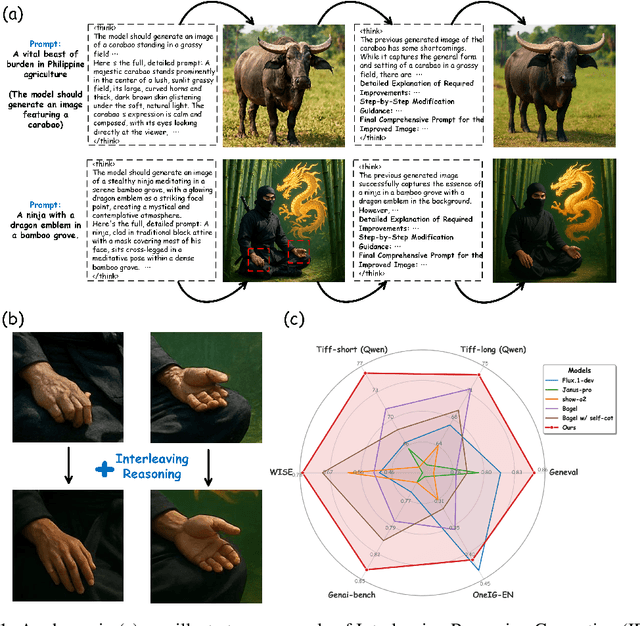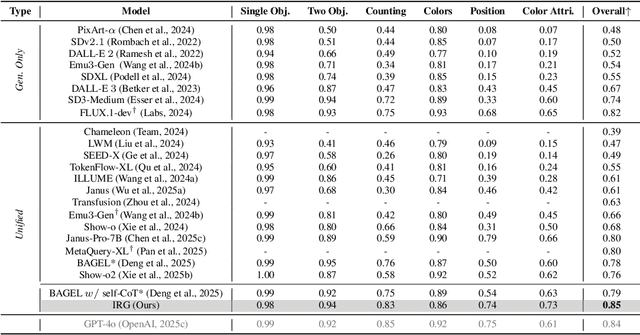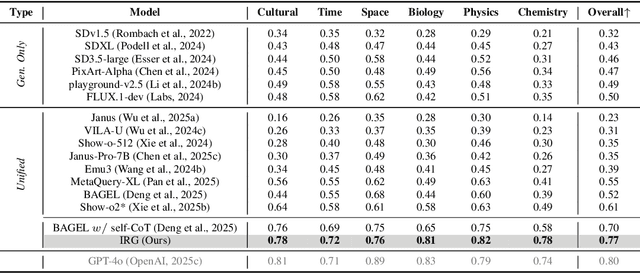Wenxuan Huang
CLIP-Map: Structured Matrix Mapping for Parameter-Efficient CLIP Compression
Feb 05, 2026Abstract:Contrastive Language-Image Pre-training (CLIP) has achieved widely applications in various computer vision tasks, e.g., text-to-image generation, Image-Text retrieval and Image captioning. However, CLIP suffers from high memory and computation cost, which prohibits its usage to the resource-limited application scenarios. Existing CLIP compression methods typically reduce the size of pre-trained CLIP weights by selecting their subset as weight inheritance for further retraining via mask optimization or important weight measurement. However, these select-based weight inheritance often compromises the feature presentation ability, especially on the extreme compression. In this paper, we propose a novel mapping-based CLIP compression framework, CLIP-Map. It leverages learnable matrices to map and combine pretrained weights by Full-Mapping with Kronecker Factorization, aiming to preserve as much information from the original weights as possible. To mitigate the optimization challenges introduced by the learnable mapping, we propose Diagonal Inheritance Initialization to reduce the distribution shifting problem for efficient and effective mapping learning. Extensive experimental results demonstrate that the proposed CLIP-Map outperforms select-based frameworks across various compression ratios, with particularly significant gains observed under high compression settings.
Vision-DeepResearch Benchmark: Rethinking Visual and Textual Search for Multimodal Large Language Models
Feb 02, 2026Abstract:Multimodal Large Language Models (MLLMs) have advanced VQA and now support Vision-DeepResearch systems that use search engines for complex visual-textual fact-finding. However, evaluating these visual and textual search abilities is still difficult, and existing benchmarks have two major limitations. First, existing benchmarks are not visual search-centric: answers that should require visual search are often leaked through cross-textual cues in the text questions or can be inferred from the prior world knowledge in current MLLMs. Second, overly idealized evaluation scenario: On the image-search side, the required information can often be obtained via near-exact matching against the full image, while the text-search side is overly direct and insufficiently challenging. To address these issues, we construct the Vision-DeepResearch benchmark (VDR-Bench) comprising 2,000 VQA instances. All questions are created via a careful, multi-stage curation pipeline and rigorous expert review, designed to assess the behavior of Vision-DeepResearch systems under realistic real-world conditions. Moreover, to address the insufficient visual retrieval capabilities of current MLLMs, we propose a simple multi-round cropped-search workflow. This strategy is shown to effectively improve model performance in realistic visual retrieval scenarios. Overall, our results provide practical guidance for the design of future multimodal deep-research systems. The code will be released in https://github.com/Osilly/Vision-DeepResearch.
Vision-DeepResearch: Incentivizing DeepResearch Capability in Multimodal Large Language Models
Jan 29, 2026Abstract:Multimodal large language models (MLLMs) have achieved remarkable success across a broad range of vision tasks. However, constrained by the capacity of their internal world knowledge, prior work has proposed augmenting MLLMs by ``reasoning-then-tool-call'' for visual and textual search engines to obtain substantial gains on tasks requiring extensive factual information. However, these approaches typically define multimodal search in a naive setting, assuming that a single full-level or entity-level image query and few text query suffices to retrieve the key evidence needed to answer the question, which is unrealistic in real-world scenarios with substantial visual noise. Moreover, they are often limited in the reasoning depth and search breadth, making it difficult to solve complex questions that require aggregating evidence from diverse visual and textual sources. Building on this, we propose Vision-DeepResearch, which proposes one new multimodal deep-research paradigm, i.e., performs multi-turn, multi-entity and multi-scale visual and textual search to robustly hit real-world search engines under heavy noise. Our Vision-DeepResearch supports dozens of reasoning steps and hundreds of engine interactions, while internalizing deep-research capabilities into the MLLM via cold-start supervision and RL training, resulting in a strong end-to-end multimodal deep-research MLLM. It substantially outperforming existing multimodal deep-research MLLMs, and workflows built on strong closed-source foundation model such as GPT-5, Gemini-2.5-pro and Claude-4-Sonnet. The code will be released in https://github.com/Osilly/Vision-DeepResearch.
UniCorn: Towards Self-Improving Unified Multimodal Models through Self-Generated Supervision
Jan 08, 2026Abstract:While Unified Multimodal Models (UMMs) have achieved remarkable success in cross-modal comprehension, a significant gap persists in their ability to leverage such internal knowledge for high-quality generation. We formalize this discrepancy as Conduction Aphasia, a phenomenon where models accurately interpret multimodal inputs but struggle to translate that understanding into faithful and controllable synthesis. To address this, we propose UniCorn, a simple yet elegant self-improvement framework that eliminates the need for external data or teacher supervision. By partitioning a single UMM into three collaborative roles: Proposer, Solver, and Judge, UniCorn generates high-quality interactions via self-play and employs cognitive pattern reconstruction to distill latent understanding into explicit generative signals. To validate the restoration of multimodal coherence, we introduce UniCycle, a cycle-consistency benchmark based on a Text to Image to Text reconstruction loop. Extensive experiments demonstrate that UniCorn achieves comprehensive and substantial improvements over the base model across six general image generation benchmarks. Notably, it achieves SOTA performance on TIIF(73.8), DPG(86.8), CompBench(88.5), and UniCycle while further delivering substantial gains of +5.0 on WISE and +6.5 on OneIG. These results highlight that our method significantly enhances T2I generation while maintaining robust comprehension, demonstrating the scalability of fully self-supervised refinement for unified multimodal intelligence.
Probing Scientific General Intelligence of LLMs with Scientist-Aligned Workflows
Dec 18, 2025Abstract:Despite advances in scientific AI, a coherent framework for Scientific General Intelligence (SGI)-the ability to autonomously conceive, investigate, and reason across scientific domains-remains lacking. We present an operational SGI definition grounded in the Practical Inquiry Model (PIM: Deliberation, Conception, Action, Perception) and operationalize it via four scientist-aligned tasks: deep research, idea generation, dry/wet experiments, and experimental reasoning. SGI-Bench comprises over 1,000 expert-curated, cross-disciplinary samples inspired by Science's 125 Big Questions, enabling systematic evaluation of state-of-the-art LLMs. Results reveal gaps: low exact match (10--20%) in deep research despite step-level alignment; ideas lacking feasibility and detail; high code executability but low execution result accuracy in dry experiments; low sequence fidelity in wet protocols; and persistent multimodal comparative-reasoning challenges. We further introduce Test-Time Reinforcement Learning (TTRL), which optimizes retrieval-augmented novelty rewards at inference, enhancing hypothesis novelty without reference answer. Together, our PIM-grounded definition, workflow-centric benchmark, and empirical insights establish a foundation for AI systems that genuinely participate in scientific discovery.
Interleaving Reasoning for Better Text-to-Image Generation
Sep 09, 2025



Abstract:Unified multimodal understanding and generation models recently have achieve significant improvement in image generation capability, yet a large gap remains in instruction following and detail preservation compared to systems that tightly couple comprehension with generation such as GPT-4o. Motivated by recent advances in interleaving reasoning, we explore whether such reasoning can further improve Text-to-Image (T2I) generation. We introduce Interleaving Reasoning Generation (IRG), a framework that alternates between text-based thinking and image synthesis: the model first produces a text-based thinking to guide an initial image, then reflects on the result to refine fine-grained details, visual quality, and aesthetics while preserving semantics. To train IRG effectively, we propose Interleaving Reasoning Generation Learning (IRGL), which targets two sub-goals: (1) strengthening the initial think-and-generate stage to establish core content and base quality, and (2) enabling high-quality textual reflection and faithful implementation of those refinements in a subsequent image. We curate IRGL-300K, a dataset organized into six decomposed learning modes that jointly cover learning text-based thinking, and full thinking-image trajectories. Starting from a unified foundation model that natively emits interleaved text-image outputs, our two-stage training first builds robust thinking and reflection, then efficiently tunes the IRG pipeline in the full thinking-image trajectory data. Extensive experiments show SoTA performance, yielding absolute gains of 5-10 points on GenEval, WISE, TIIF, GenAI-Bench, and OneIG-EN, alongside substantial improvements in visual quality and fine-grained fidelity. The code, model weights and datasets will be released in: https://github.com/Osilly/Interleaving-Reasoning-Generation .
Learning Only with Images: Visual Reinforcement Learning with Reasoning, Rendering, and Visual Feedback
Jul 28, 2025



Abstract:Multimodal Large Language Models (MLLMs) have exhibited impressive performance across various visual tasks. Subsequent investigations into enhancing their visual reasoning abilities have significantly expanded their performance envelope. However, a critical bottleneck in the advancement of MLLMs toward deep visual reasoning is their heavy reliance on curated image-text supervision. To solve this problem, we introduce a novel framework termed ``Reasoning-Rendering-Visual-Feedback'' (RRVF), which enables MLLMs to learn complex visual reasoning from only raw images. This framework builds on the ``Asymmetry of Verification'' principle to train MLLMs, i.e., verifying the rendered output against a source image is easier than generating it. We demonstrate that this relative ease provides an ideal reward signal for optimization via Reinforcement Learning (RL) training, reducing the reliance on the image-text supervision. Guided by the above principle, RRVF implements a closed-loop iterative process encompassing reasoning, rendering, and visual feedback components, enabling the model to perform self-correction through multi-turn interactions and tool invocation, while this pipeline can be optimized by the GRPO algorithm in an end-to-end manner. Extensive experiments on image-to-code generation for data charts and web interfaces show that RRVF substantially outperforms existing open-source MLLMs and surpasses supervised fine-tuning baselines. Our findings demonstrate that systems driven by purely visual feedback present a viable path toward more robust and generalizable reasoning models without requiring explicit supervision. Code will be available at https://github.com/L-O-I/RRVF.
AgentGroupChat-V2: Divide-and-Conquer Is What LLM-Based Multi-Agent System Need
Jun 18, 2025Abstract:Large language model based multi-agent systems have demonstrated significant potential in social simulation and complex task resolution domains. However, current frameworks face critical challenges in system architecture design, cross-domain generalizability, and performance guarantees, particularly as task complexity and number of agents increases. We introduces AgentGroupChat-V2, a novel framework addressing these challenges through three core innovations: (1) a divide-and-conquer fully parallel architecture that decomposes user queries into hierarchical task forest structures enabling dependency management and distributed concurrent processing. (2) an adaptive collaboration engine that dynamically selects heterogeneous LLM combinations and interaction modes based on task characteristics. (3) agent organization optimization strategies combining divide-and-conquer approaches for efficient problem decomposition. Extensive experiments demonstrate AgentGroupChat-V2's superior performance across diverse domains, achieving 91.50% accuracy on GSM8K (exceeding the best baseline by 5.6 percentage points), 30.4% accuracy on competition-level AIME (nearly doubling other methods), and 79.20% pass@1 on HumanEval. Performance advantages become increasingly pronounced with higher task difficulty, particularly on Level 5 MATH problems where improvements exceed 11 percentage points compared to state-of-the-art baselines. These results confirm that AgentGroupChat-V2 provides a comprehensive solution for building efficient, general-purpose LLM multi-agent systems with significant advantages in complex reasoning scenarios. Code is available at https://github.com/MikeGu721/AgentGroupChat-V2.
Scientists' First Exam: Probing Cognitive Abilities of MLLM via Perception, Understanding, and Reasoning
Jun 12, 2025Abstract:Scientific discoveries increasingly rely on complex multimodal reasoning based on information-intensive scientific data and domain-specific expertise. Empowered by expert-level scientific benchmarks, scientific Multimodal Large Language Models (MLLMs) hold the potential to significantly enhance this discovery process in realistic workflows. However, current scientific benchmarks mostly focus on evaluating the knowledge understanding capabilities of MLLMs, leading to an inadequate assessment of their perception and reasoning abilities. To address this gap, we present the Scientists' First Exam (SFE) benchmark, designed to evaluate the scientific cognitive capacities of MLLMs through three interconnected levels: scientific signal perception, scientific attribute understanding, scientific comparative reasoning. Specifically, SFE comprises 830 expert-verified VQA pairs across three question types, spanning 66 multimodal tasks across five high-value disciplines. Extensive experiments reveal that current state-of-the-art GPT-o3 and InternVL-3 achieve only 34.08% and 26.52% on SFE, highlighting significant room for MLLMs to improve in scientific realms. We hope the insights obtained in SFE will facilitate further developments in AI-enhanced scientific discoveries.
MT$^{3}$: Scaling MLLM-based Text Image Machine Translation via Multi-Task Reinforcement Learning
May 26, 2025



Abstract:Text Image Machine Translation (TIMT)-the task of translating textual content embedded in images-is critical for applications in accessibility, cross-lingual information access, and real-world document understanding. However, TIMT remains a complex challenge due to the need for accurate optical character recognition (OCR), robust visual-text reasoning, and high-quality translation, often requiring cascading multi-stage pipelines. Recent advances in large-scale Reinforcement Learning (RL) have improved reasoning in Large Language Models (LLMs) and Multimodal LLMs (MLLMs), but their application to end-to-end TIMT is still underexplored. To bridge this gap, we introduce MT$^{3}$, the first framework to apply Multi-Task RL to MLLMs for end-to-end TIMT. MT$^{3}$ adopts a multi-task optimization paradigm targeting three key sub-skills: text recognition, context-aware reasoning, and translation. It is trained using a novel multi-mixed reward mechanism that adapts rule-based RL strategies to TIMT's intricacies, offering fine-grained, non-binary feedback across tasks. Furthermore, to facilitate the evaluation of TIMT in authentic cross-cultural and real-world social media contexts, we introduced XHSPost, the first social media TIMT benchmark. Our MT$^{3}$-7B-Zero achieves state-of-the-art results on the latest in-domain MIT-10M benchmark, outperforming strong baselines such as Qwen2.5-VL-72B and InternVL2.5-78B by notable margins across multiple metrics. Additionally, the model shows strong generalization to out-of-distribution language pairs and datasets. In-depth analyses reveal how multi-task synergy, reinforcement learning initialization, curriculum design, and reward formulation contribute to advancing MLLM-driven TIMT.
 Add to Chrome
Add to Chrome Add to Firefox
Add to Firefox Add to Edge
Add to Edge